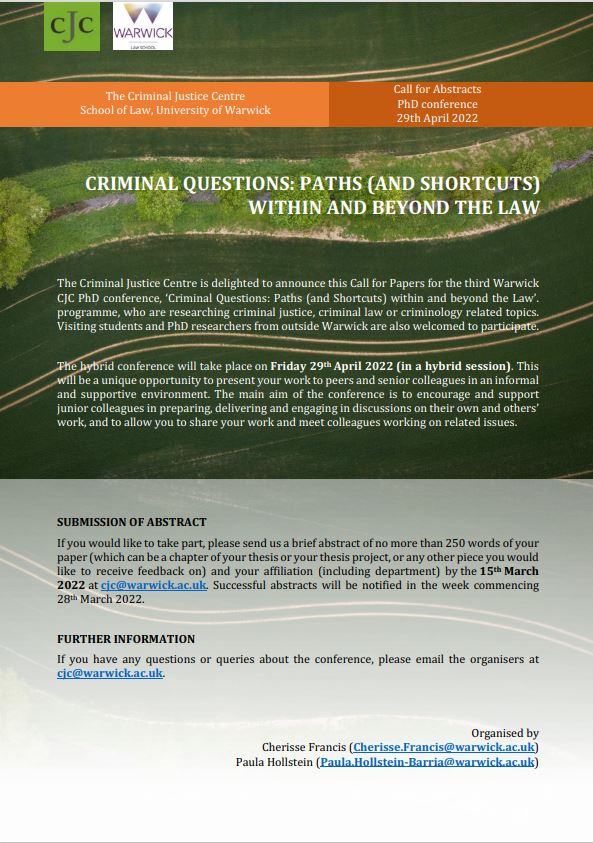News
Welcome to Dr Maryna Utkina, Fernandes Fellow from Sumy State University Ukraine
The University of Warwick School of Law has successfully sponsored a Fernandes Fellowship devoted to academics in Ukraine. Dr Maryna Utkina is now at Warwick and will be with us until the end of this calendar year.
Dr Utkina is a Senior Lecturer in the Criminal Law and Procedure Department at Sumy State University. Her research is on financial regulation and criminal law enforcement of illicit proceeds from organised crime -including terrorism, money laundering and corruption. A brief explanation is below:
In my work I define the place of financial intelligence (monitoring) in the system of combating money laundering and compare foreign financial intelligence units. It serves as one of the most sovereign remedies in the system of counteracting money laundering to minimize and effectively combat organized criminality and money laundering. The high level of development of the shadow economy, corruption, ineffectiveness of regulatory and legal support, as well as duplication of functions of individual authorities have become prerequisites for the financial monitoring system formation.
The main issues I would like to research here:
- a comparative analysis of theoretic and legal framework: to compare notions or definitions of financial intelligence (monitoring); acts and codes which regulate this question;
- compare financial intelligence duties: the system of such authorities and their duties;
- research in general this activity, its levels, main points and the process at all;
- research financial intelligence in the system of corruption prevention: best practices and others.
She is based at the IAS and can be contactable at: m.utkina@yur.sumdu.edu.ua. She is very keen on getting to know colleagues while she is here.
'The McDonaldization of justice and the disappearance of fair trial?' Conference 19- 21 May 2022
From 19 - 21 May 2022 the 11th conference in the series The Future of Adversarial and Inquisitorial System, a collaboration between the Universities of Warwick, North Carolina, Bologna, Basel and Duke University will be hosted at Scarman House, University of Warwick.
The conference draws upon what Ritzer has described as a kind of McDonaldization of criminal justice. As the trial becomes increasingly rare, along with opportunities to challenge the reliability of evidence, the accused finds herself encouraged to make an admission at the earliest opportunity based on the information gathered during the police investigation. The presence of defence counsel at strategic points in the process lends some legitimacy, but the practices of law reflect little of the safeguards and values so celebrated in the rhetoric of both adversarial and inquisitorial-type systems. Processes are being ‘simplified’ – not in ways that make the process clear and easy to navigate – but through the removal of fundamental safeguards deemed too costly and time-consuming such as juries, judicial investigation, or any form of trial or contestation of charges. Added to this are new types of evidence, gathered in as yet unregulated ways, the nature and provenance of which require careful scrutiny if they are to form the basis of prosecution and conviction.
Several conference panels will be devoted to discussion of these themes drawing on Hodgson’s The Metamorphosis of Criminal Justice (2020, OUP). In this work, through a comparative analysis of the potentially radical and fundamental changes taking place across two contrasting jurisdictions (England and Wales, and France), she explores the ways that criminal justice traditions continue to be shaped in different ways by broader policy and political concerns, and the ways in which different systems adapt, change and distort when faced with (sometimes conflicting) pressures domestically and externally. This comparative lens also illuminates the ways that, in England and Wales and in France, different procedural values may serve to structure or limit reform, and so work to facilitate or resist change.
Thursday 19th May is devoted to presentations from Early Career Researchers. View the programme.
Attendance is free, but participants must register via email first to secure a place.
The main conference takes place on Friday 20th and the morning of Saturday 21st May. View the programmeLink opens in a new window.
All are welcome but you must register via email and there is a small charge for attendance (£35 Friday, including lunch; £25 Saturday). You are also welcome to join the conference dinner on the evening of Friday 20th May at a cost of £35.
More details including conference programmes and registration details can be found here.
Call for papers : Third Annual CJC PhD Research Conference
The Criminal Justice Centre will be hosting its third annual PhD research conference on Friday 29th April 2022.
The theme for this year is: 'Criminal Questions: Paths (and Shortcuts) within and beyond the Law'.
This one-day conference seeks to bring together PhD researchers at any stage of their programme who are interested in topics related to criminal justice, criminal law or criminology.
Submission of Abstract:
If you are interested in participting please submit an abstract of no more than 250 words to cjc@warwick.ac.uk .
When submitting this abstract include your name, institutional affiliation and department.
The deadline for submission of abstracts is 15th March 2022.
Successful applicants will be notified in the week commencing 28th March 2022.

Valérie Hayaert awarded prestigeous Eutopia Science and Innovation Fellowship at the Universirty of Warwick (Criminal Justice Centre)
Expert Report on COVID-19 and the Criminal Law
Two members of the Criminal Justice Centre Henrique Carvalho and Anastasia Chamberlen recently worked with colleagues from Brunel University London, University of Oxford and University of York on an expert report on COVID-19 and the criminal law which was submitted to the Parliamentary Justice Committee.
The written expert which these academics submitted can be viewed here: Expert evidence on COVID-19 and the criminal law .
